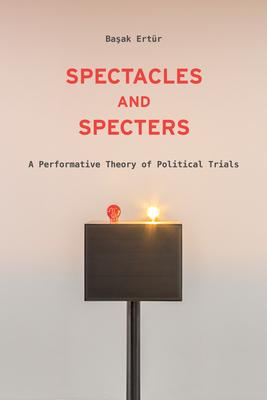WINNER, SLSA SOCIO-LEGAL THEORY AND HISTORY PRIZE
SHORTLISTED, THE HART-SLSA BOOK PRIZE Spectacles and Specters draws on theories of performativity to conceptualize the entanglements of law and political violence, offering a radical departure from accounts that consider political trials as instrumental in exercising or containing political violence. Legal scholar Başak Ertür argues instead that making sense of the often incalculable interpenetrations of law, politics, and violence in trials requires shifting the focus away from law's instrumentality to its performativity. Ertr develops a theory of political trials by reconstructing and building on a legacy of critical thought on Nuremberg in close engagement with theories of performativity. She then offers original case studies that introduce a new perspective by looking beyond the Holocaust trials, to the Armenian genocide and its fragmentary legal aftermaths. These cases include the 1921 trial of Soghomon Tehlirian, the 2007-21 Hrant Dink Murder Trial, and the 2015 case before the European Court of Human Rights concerning the denial of the Armenian genocide. Enabling us to capture the various modalities in which the political emerges in, through and in relation to legal forms on the stage of the trial, this focus on law's performativity also allows us to account for how sovereign schemes can misfire and how trials can come to have unintended political lives and afterlives. Further, it reveals how law is entangled with and perpetuates certain histories of violence, rather than simply ever mastering these histories or providing closure.
Book
Spectacles and Specters: A Performative Theory of Political Trials
(Write a Review)
Paperback
$31.67
WINNER, SLSA SOCIO-LEGAL THEORY AND HISTORY PRIZE
SHORTLISTED, THE HART-SLSA BOOK PRIZE Spectacles and Specters draws on theories of performativity to conceptualize the entanglements of law and political violence, offering a radical departure from accounts that consider political trials as instrumental in exercising or containing political violence. Legal scholar Başak Ertür argues instead that making sense of the often incalculable interpenetrations of law, politics, and violence in trials requires shifting the focus away from law's instrumentality to its performativity. Ertr develops a theory of political trials by reconstructing and building on a legacy of critical thought on Nuremberg in close engagement with theories of performativity. She then offers original case studies that introduce a new perspective by looking beyond the Holocaust trials, to the Armenian genocide and its fragmentary legal aftermaths. These cases include the 1921 trial of Soghomon Tehlirian, the 2007-21 Hrant Dink Murder Trial, and the 2015 case before the European Court of Human Rights concerning the denial of the Armenian genocide. Enabling us to capture the various modalities in which the political emerges in, through and in relation to legal forms on the stage of the trial, this focus on law's performativity also allows us to account for how sovereign schemes can misfire and how trials can come to have unintended political lives and afterlives. Further, it reveals how law is entangled with and perpetuates certain histories of violence, rather than simply ever mastering these histories or providing closure.Paperback
$31.67